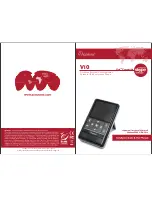
Configuring the wireless AP
A31003-W1040-U101-1-7619, July 2006 DRAFT
70
HiPath Wireless Controller, Access Points and Convergence Software V4.0, C10/C100/C1000 User Guide
hwc_apstartup.fm
Wireless AP overview
Wireless AP radios
The wireless AP has two radios:
●
5 GHz radio supporting the 802.11a standard –
The 802.11a standard is an extension
to 802.11 that applies to wireless LANs and provides up to 54 Mbps in the 5-GHz band.
The 802.11a standard uses an orthogonal frequency division multiplexing encoding
scheme, rather than Frequency-Hoping Spread Spectrum (FHSS) or Direct-Sequence
Spread Spectrum (DSSS).
●
2.4 GHz radio supporting the 802.11b/g standards –
The 802.11g standard applies to
wireless LANs and specifies a transmission rate of 54 Mbps. The 802.11b (High Rate)
standard is an extension to 802.11 that specifies a transmission rate of 11 Mbps. Since
802.11g uses the same communication frequency range as 802.11b (2.4 GHz), 802.11g
devices can co-exist with 802.11b devices on the same network.
The radios on the wireless AP are enabled or disabled through the HiPath Wireless Assistant.
Both radios can be enabled to offer service simultaneously. For more information, see Section
7.1, “Topology for a VNS”, on page 124.
The Unlicensed National Information Infrastructure (U-NII) bands are three frequency bands of
100 MHz each in the 5 GHz band, designated for short-range, high-speed, wireless networking
communication.
The Wireless AP supports the full range of 802.11a:
●
5.15 to 5.25 GHz – U-NII Low Band
●
5.25 to 5.35 GHz – U-NII Middle Band
●
5.725 to 5.825 GHz – U-NII High Band
●
New 5.470 GHz to 5.725 GHz Band (when approved by FCC)
Wireless AP international licensing
Wireless APs are licensed to operate in North America, Japan (Wireless APs support 802.11j),
the European Union countries, and European Union free trade countries. Each European
Union country is assigned a particular radio band. The wireless AP must be configured to
operate on the appropriate radio band according to each European Union country. For more
information, see Section 2.2.3, “European Community”, on page 22.
>
In order to comply with FCC regulations in North America, the U-NII Low Band (5.15
to 5.25 GHz band) is disabled for the Model AP2620.
















































